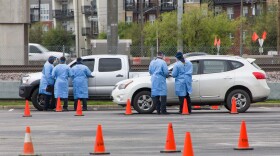Audrey Carlsen
-
Are COVID hospitalizations high where you live? Look up your hospitalCOVID-19 hospitalizations continue to strain U.S. hospitals in certain places, while the burden is easing up in other areas. Look up your local hospital to see how it's faring.
-
Parts of the West Coast experienced very unhealthy or hazardous air from wildfires for the first time ever recorded. Millions endured that smoke for twice as long as the recent average.
-
An NPR investigation shows that black and Latino neighborhoods in four large Texas cities have fewer coronavirus testing sites, leaving communities blind to potential COVID-19 outbreaks.
-
An Abstract Look At The Food We EatPhotographer Ajay Malghan takes familiar foods and makes them look foreign. He says it's a statement on genetically modified food, but if you want to just appreciate it as abstract art, that's OK too.
-
A push to make narcotic painkillers harder to abuse means that generic versions of OxyContin won't be allowed. But drugs that are more resistant to abuse are expensive and can still be addictive.
-
Ricin is a naturally occurring toxin found in castor beans. You can get sick by eating beans. But purified ricin can be made pretty easily and used for no-good.
-
Research in mice suggests that short-term hearing loss caused by loud noise like rock concerts may protect ears from more serious damage. But adapting to noise can be dangerous, researchers warn.
-
Wild animals use all sorts of plants and natural substances to ward off illness. There are chimpanzees that eat leaves to purge parasites and bees that coat hives with resin to beat back bacteria.
-
Scientists have developed a chocolate infused with fruit juice that they say can replace up to half the fat found in normal chocolate. This hybrid treat, they say, is a tasty, healthier alternative.
-
Critics argue that wind turbine syndrome is a fictional malady perpetuated by people angered by the turbines in their communities. Now experts are weighing in on whether it could be real.







